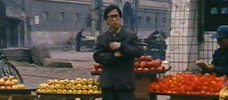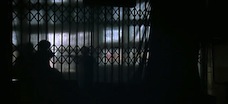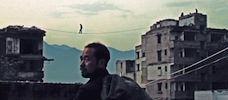Reviews
Shíjié
Jia Zhangke
China, 2004
Credits
Review by Rumsey Taylor
Posted on 26 May 2011
Source Masters of Cinema BD
Categories Jia Zhangke’s Migrations
See the world without ever leaving Beijing
The Beijing World Park manifests the above slogan in over a hundred acres of iconic, miniaturized tourist attractions transported from other parts of the world: the leaning tower of Pisa, Stonehenge, or the skyline of lower Manhattan sporting two egregious Twin Towers. A monorail winds between these structures, and wide shots that track its occupants (typically Tao, who performs as a dancer at the park) compose these peripheral attractions together, succinctly establishing the discrepancy of seeing the Eiffel Tower, for example, within walking distance of the Great Pyramid.
In a sense these icons have been recontextualized, and serve the purpose of satisfying a low- and middle-class populace unable to visit them in their original locations. Individually each attraction is an impressive facsimile, often constructed with the same materials and proportional to its antecedent. It all amounts to a fantasy so elaborately fabricated that it’s difficult to see past the World Park’s prodigal artifice.
The setting for Jia Zhangke’s fourth film, The World, the Beijing World Park houses a subset of the aforementioned populace: they are members of China’s working class, only they work in the park in low-paying jobs as performers or security guards. They pass through the park so often that its novelty is lost on them; rather, they are a part of the novelty, so absorbed in the illusion that even their outward emotions seem artificial. Tao, for example, is introduced in the kaleidoscopic title credits, her incorruptible smile as embellished as the glistening headdress she wears.
Early in the film Tao befriends one of a slew of Russian immigrants who have been brought to the park for ambiguous reasons (shortly after their arrival, each is suspiciously deprived of her passport). Tao also has a boyfriend, one of the park’s security guards, and when they’re seen together it’s typically in the aftermath of a failed romantic tryst at the seedy hotel he lives in. Despite the relentlessly pleasant demeanor that their service job demands, none of them is genuinely happy. They live within their means, and with occupations steeped so deeply in fabrication that their true emotions are suppressed accordingly.
This suppression is highly subversive, given that The World is the first of Jia’s films to have been produced within the Chinese Film Bureau, an administration that exists in part to ensure a positive global perception of the country. The films it subsidizes may be censored at two intercepts: one, in script form, and two, after final cut. The World was Jia’s largest and most elaborate film to date, complemented in a higher production budget and high-profile setting, but its most incredible feature is its emergence from a government it interpretably criticizes—one that by some means invests in a smokescreen that cloaks its people’s desperation.
Tao’s desperation is more or less at the film’s forefront. She’s with her boyfriend because he’s a convenient source of intimacy. She’s courted by her ex-boyfriend at the beginning, who’s on a quick visit to the park prior to another trip, and later by a man at a karaoke bar—he attempts to solicit her body in a revelation that Tao, like the Russian immigrants, will remain suppressed and commodified. All the while, she continues to perform in that smile that so determinedly obscures her troubles.
It’s not long before this desperation becomes evident in most every character, and sometimes it ignites flourishes of emotion Jia depicts in vibrant animation. These will accompany the receipt of a text message, its content emblazoned on screen and appending an emotional keyframe. Visually these moments are no less elaborate than World Park, but they’re reprieves, and the fantasy they depict (in one, Tao, dressed as a flight attendant, flies over World Park) is more authentically felt than the campus of attractions that backdrop them.
It’s in these moments that the film’s title inherits a second meaning. The World refers to Beijing World Park in a literal sense, but the world it depicts is focused on a modest assembly of characters. The film isn’t about the park inasmuch as it is its inhabitants, particularly the worlds they have solicited for themselves. That these worlds are, in turn, so narrow is a tragedy, and, however paradoxically, evidence of the casualties of globalization.
More Jia Zhangke’s Migrations
-

Xiao Wu
1998 -

Unknown Pleasures
2002 -

The World
2004 -

Useless
2007 -

Still Life
2006 -

Dong
2006 -

24 City
2008
We don’t do comments anymore, but you may contact us here or find us on Twitter or Facebook.



